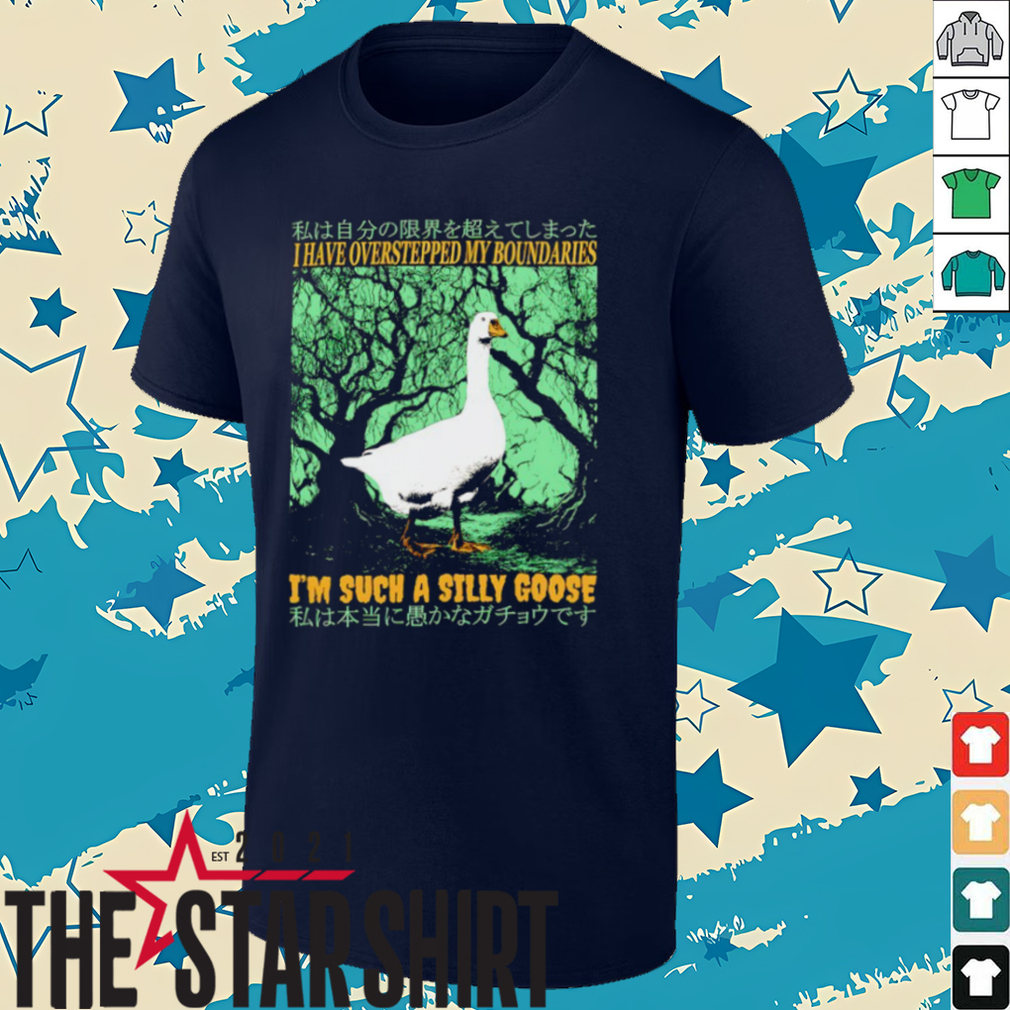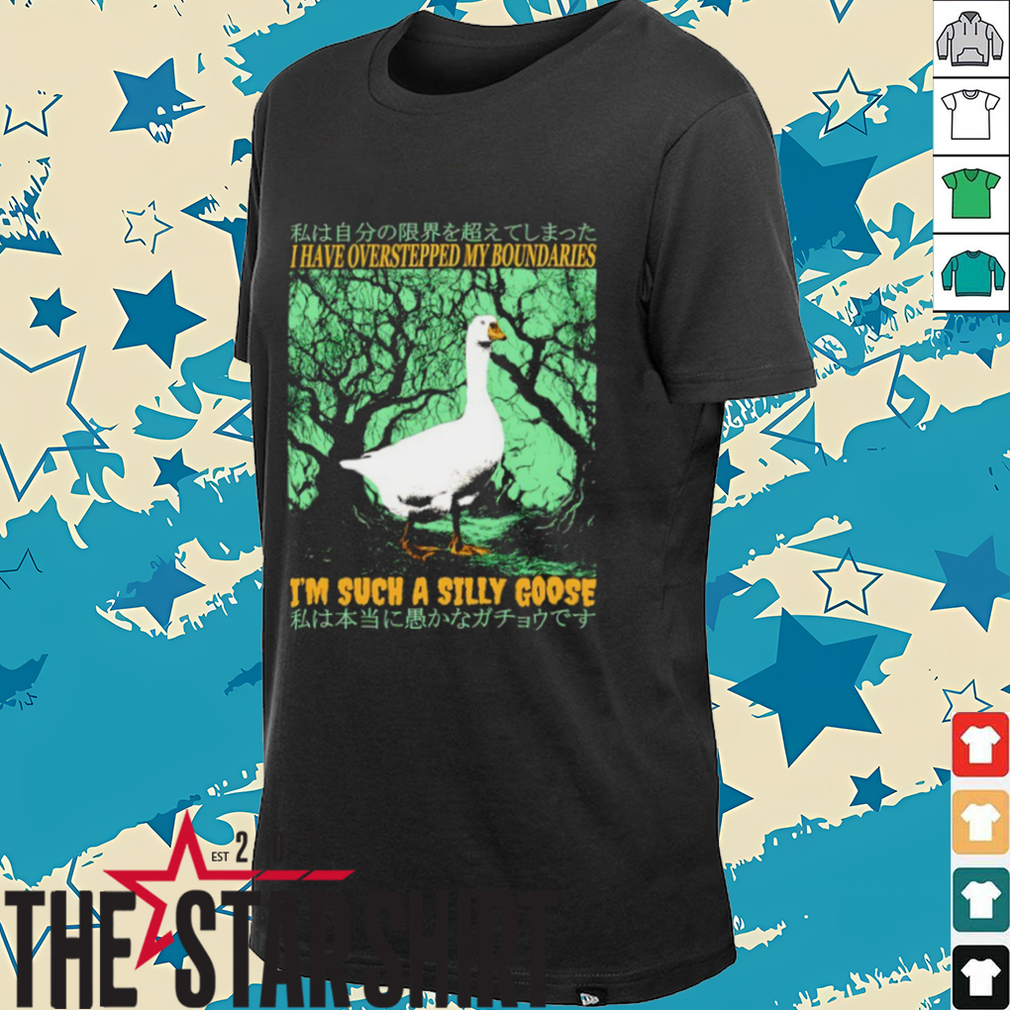Decoding the “I Have Overstepped My Boundaries I’m Such a Silly Goose Japanese Shirt” Phenomenon
The **”I have overstepped my boundaries I’m such a silly goose Japanese shirt”** is a fascinating example of how niche internet humor, combined with global cultural influences, can create a widely appealing and thought-provoking statement. This shirt isn’t just a quirky fashion choice; it represents a blend of self-deprecating humor, a nod to viral trends, and an intriguing twist with its “Japanese shirt” descriptor. But what makes this specific combination so compelling, and why does this shirt resonate with those who appreciate its unique blend of wit and introspection?
At its core, the phrase “I have overstepped my boundaries, I’m such a silly goose” speaks to a relatable human experience: the moment of realizing you’ve gone too far, said too much, or acted impulsively. It’s an admission of minor transgression, immediately softened by a whimsical, almost childlike self-forgiveness. The term “silly goose” disarms the potential seriousness of “overstepping boundaries,” turning a moment of potential awkwardness into an endearing, almost charming, misstep. This type of self-effacing humor has a strong appeal, as it allows individuals to express vulnerability and humility in a lighthearted way. It’s a comedic trope often seen in online communities and memes, where relatable everyday blunders are exaggerated for humorous effect. The phrase itself embodies a certain internet-native sensibility, where self-awareness often comes packaged with a healthy dose of irony and gentle self-mockery.

The “Japanese shirt” element adds another intriguing layer. While the phrase itself is English, the inclusion of “Japanese” in the description hints at a style influence or a design aesthetic often associated with contemporary Japanese graphic tees, which frequently feature English text that might be whimsical, philosophical, or slightly nonsensical out of context. This cross-cultural blend creates a unique appeal, resonating with those who appreciate both internet humor and distinctive global fashion trends. It’s a statement that signals a wearer who is in on the joke, embraces their quirks, and has an eye for unconventional style. If you like to zoom in this way, you can also refer to some popular designs other like Big League Chew Fernando Tatis Jr El Nino Sour Apple The Ballplayers Bubble Gum Shirt, which similarly blends specific cultural references with a playful attitude.
—
The Appeal of Self-Deprecating Humor and Relatable Blunders
The core of the “I have overstepped my boundaries, I’m such a silly goose” message lies in its expert use of self-deprecating humor. In an online world often dominated by curated perfection, this kind of honesty, wrapped in a whimsical package, provides a refreshing contrast. Why does admitting to being a “silly goose” resonate so strongly, and what psychological impact does it have on both the wearer and the observer?

Self-deprecating humor is a powerful social tool. It humanizes individuals, making them more approachable and relatable. When someone admits to a minor flaw or blunder in a lighthearted way, it signals humility and a lack of ego, qualities that often endear them to others. The phrase “overstepped my boundaries” is a common social faux pas, something many people can recall doing. Pairing it with “silly goose” defuses the potential embarrassment and transforms it into a moment of shared amusement. It creates an instant connection, as others recognize their own similar experiences. Psychology Today notes that self-deprecating humor can build rapport by showing vulnerability and trustworthiness. It implies a person who doesn’t take themselves too seriously, a trait highly valued in informal social settings. This shirt essentially says, “I’m not perfect, I make mistakes, and I can laugh at myself for it – just like you.” This shared understanding creates a sense of community among those who wear or appreciate the sentiment, making the shirt more than just clothing, but a subtle signal of personality and perspective.
—
The “Japanese Shirt” Element: Cultural Cues and Aesthetic Trends
The inclusion of **”Japanese shirt”** in the description of this quirky garment adds a fascinating layer, hinting at a specific aesthetic and cultural influence that enhances its appeal. While the text is in English, this descriptor suggests a design sensibility often found in contemporary Japanese fashion. What are these characteristic elements, and how do they contribute to the shirt’s overall message and market value?

Modern Japanese street fashion often features minimalist designs, unconventional typography, and English phrases that can range from profound to playfully nonsensical. There’s a particular charm in the way English text is sometimes used in Japanese apparel, where the aesthetic quality of the words themselves can be as important as their literal meaning. This shirt likely incorporates clean lines, perhaps a unique font, or a specific graphic style that aligns with popular Japanese streetwear trends. The “Japanese shirt” designation suggests an intentional design choice that elevates it beyond a simple novelty item. It implies a certain coolness factor, an appreciation for global style influences, and a subtle nod to the unique blend of pop culture and high fashion often seen emerging from Tokyo. This fusion of a universally relatable human sentiment with a distinct aesthetic adds depth and market appeal, making it attractive to those who value unique and globally-inspired clothing. For more variety, you can pair this with a fan favorite model, or explore upcoming textures, collection of patterns… I am also one of the most popular customers when it comes to unique cross-cultural fashion statements.
—
From Online Meme to Wearable Art: The Shirt as a Statement Piece
The transformation of a quirky phrase into a wearable item like the **”I have overstepped my boundaries I’m such a silly goose Japanese shirt”** exemplifies a modern phenomenon: the migration of internet culture into tangible fashion. This shirt acts as a statement piece, allowing individuals to broadcast their sense of humor and unique personality in a subtle yet effective way. How does this kind of apparel function as a form of self-expression, and why does it resonate so strongly with contemporary audiences?

Wearing this shirt is an instant signal to others who appreciate niche humor and a relaxed, self-aware approach to life. It’s a conversation starter, inviting chuckles and shared understanding. In an increasingly digital world, physical merchandise that references online trends creates a tangible connection and a sense of belonging among those “in the know.” It’s a way for individuals to visibly embrace their quirky side and communicate their personality without uttering a single word. The shirt captures a zeitgeist of embracing imperfection and finding humor in everyday human blunders. It offers a counter-narrative to the pressure of constant self-optimization, instead celebrating the charm of being, at times, a “silly goose.” This kind of authentic, relatable messaging makes the shirt incredibly appealing, turning a simple garment into a symbol of a laid-back, self-aware, and subtly humorous outlook on life. It’s not just a shirt; it’s a shared laugh and a nod to our collective human experience of occasionally overstepping boundaries.


























